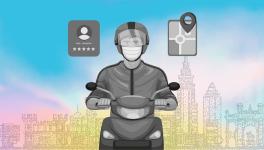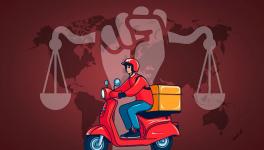Survey Reveals App Drivers’ Misery: ‘60% Report Back Problems, 90% Sleep Deprived’
The decision to invest in one’s own health has become a “very precarious” one for the app-based drivers, most of whom are finding it difficult to contribute a month’s earning to their total annual health expenditure, a survey investigating the balance between work and life for those in the digital platform economy, has noted.
This is despite a substantiate percentage of those surveyed – drivers associated with the app-based companies – self assessing their health to be in “extremely poor” conditions.
60.7 per cent of the app-based drivers claimed to have back problems, the survey that had collected over 2,000 responses from six major cities – Bengaluru, Chennai, Delhi NCR, Hyderabad, Jaipur and Lucknow – found. Other frequent ailments, faced significantly by drivers in the age group of 20-40, include constipation, liver issues, waist pain and neck pain.
The survey, conducted last year between July and November, attributed the prevailing health issues to the long arduous working hours that these app-based transport workers have to be on roads for. Nearly half of the surveyed drivers, it found, are driving customers in their vehicle for close to 20 hours a day. As a result, 89.8% of the drivers claimed that they get less than six hours of sleep.
“Occupational health is a very important indicator that has been used globally in determining under which circumstances are drivers working and its effect on their lives,” the study titled Protecting Workers in the Digital Platform Economy, jointly prepared by Indian Federation of App-based Transport Workers (IFAT) and International Transport Workers Federation (ITF), had said.
IFAT, founded last year in Mumbai, represents more than 20,000 app-based transport and delivery workers in as many as 10 cities across India. ITF is supposedly the largest transport union outside Europe, representing over 2 million workers in the Asia-Pacific region covering 30 countries.
But, despite the “insecure and hazardous” work conditions, as the two bodies noted in the survey, persisting in what is popularly known as being part of the ‘gig’ or ‘platform’ economy, drivers partnering with the app-based companies were found to take “serious thought” before spending on health – a phenomenon necessitated by their dwindling earnings over the years, according to the survey.
The survey found that 75.3% of the surveyed drivers in Bengaluru, Chennai, and Hyderabad earn less than Rs. 20,000 a month after paying for the EMI, fuel expense, penalties, etc. According to the federations, this is not something to rejoice, as often “hidden costs” including car maintenance, insurance and road tax among others limit the expenditure choice for the drivers.
Moreover, the study noted an “astronomical drop” in the earnings of the driver over the last four years – fuelled by incentive cuts on one hand and rise in fuel prices on the other.
Glaringly, 95.3% of the respondents claimed to have no form of insurance – be it accidental, health or any other. This is despite the social security initiatives being announced and strongly advertised by the digital taxi aggregator companies – majorly, two unicorns Uber and Ola – in the country.
Founded in India in 2011, Ola currently is the market leader amid taxi hailing services, with a share of 56%. Its American rival Uber, which launched its services in India in 2013, controls 40% of the domestic market.
“Although Ola and Uber have claimed that there exist health insurance schemes for drivers,” the survey noted, “on the ground none of these plans or measures are available to the drives.”
The transport workers’ bodies flayed the service agreements for using a legal parlance that “obfuscates the nature of the working relationship” and “essentially absolving the ride sharing/hailing company of all liabilities and responsibilities towards drivers and riders”.
The drivers expressed their discontent, when surveyed, on how “the state machinery seems to be working hand in glove with the companies,” the report further added. The agitations spearheaded by the gig workers over the years have brought little to no regulation onto the operations of the app-based companies.
Shaik Salauddin, national general secretary, IFAT, said that the survey only shows how “inhumanely” the app-based companies are exploiting workers through an “opaque algorithmic system”. The situation is similar across the gig economy, not sparing also the food delivery workers, he added.
“These companies call the workers its ‘partners’, even as they continue to shun these individuals,” he told NewsClick. “The workers, who drive their businesses, want to become partners also in the benefits.” Only companies like Uber, as Salauddin remarked, even the word “partner” in the agreement for drivers is being replaced with “customers” who utilise the app service for commercial gains.
The situation has largely worsened in the wake of the coronavirus outbreak, Salauddin added, which is manifested in the spate of protests led by transport workers in the recent months.
He added that the study also aims to provide a foundation to the much needed legal framework for the app-based transport workers transport. Significantly, two bills – Code on Social Security and Occupational Safety, Health and Working Condition Code – are expected to be presented in the upcoming monsoon session.
Media reports had earlier suggested that the Union Ministry of Labour and Employment has accepted the recommendation of the parliamentary panel on labour for including gig workers under the social security net.
Also read: Curbs on Internet Amount to 'Digital Apartheid' to Punish Kashmir, Says Report
Get the latest reports & analysis with people's perspective on Protests, movements & deep analytical videos, discussions of the current affairs in your Telegram app. Subscribe to NewsClick's Telegram channel & get Real-Time updates on stories, as they get published on our website.
























